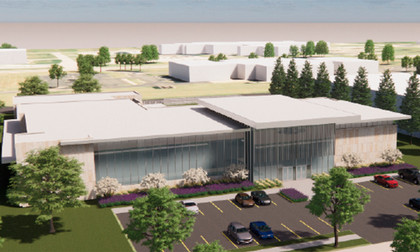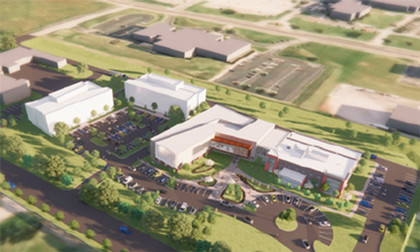The site, just off South Rouse Avenue near the Tyler Research Center, will be comprised of three distinct projects in partnership with other entities:
The company opened its doors in Joplin in 1843 and by the 1950s was providing batteries to NASA. Today, its batteries power rockets, missiles, and ejection seats, and are used for space exploration, deep sea exploration, and private, commercial, and military aviation.
After expanding to the east and west coasts, in 2005 it opened a production facility in Pittsburg’s northeast industrial park that employs about 70.
The new facility next to campus will employ 40 -- one shift of 30 hourly positions that pay $40,000 to $55,000, and 10 salaried positions that pay $75,000 to $90,000. Estimates put revenue at $13 million in its first year.
Its presence promises positive impacts to student growth and curriculum development, noted Ram Gupta, associate vice president for research and support and a scientist at NIMA.
“Eagle Picher is partnering with Pitt State to create a cutting-edge materials science curriculum that adds electrochemistry classes to engineering degrees starting this fall,” Gupta said. “This partnership not only opens new avenues for collaboration but also facilitates product development and enhances infrastructure to support a highly skilled workforce. Such initiatives are pivotal in preparing students for future challenges and opportunities in the field.”
Plans are for the facility to be complete by the end of 2025.

The KBI’s current regional office on North Broadway opened in 1999 in a rented property built in the 1950s. It now poses challenges for current needs of federal, state, and local law enforcement partners.
Modeling the success the KBI has had in Topeka with Washburn University, the goal of the KBI and Pitt State is to create a new facility to help battle the fentanyl epidemic, violent crime, and the explosion of internet crimes against children.
It will include space for KBI agents, the Kansas Highway Patrol, the Federal Bureau of Investigation, the Pittsburg Police Department, the Office of the Kansas Attorney General, the U.S. Marshals Service, and the Pittsburg State University Police Department.
It will include an evidence control center where regional law enforcement can submit and return evidence, a drug chemistry section, a child victims' unit, and secure evidence space and a garage for collecting evidence from automobiles connected to criminal cases.
Plans also feature an indoor shooting range, state-of-the-art training room, classroom space, and collaboration space, a crime scene simulation for students, and a secure space for classified or law enforcement sensitive matters.
The university will expand its education offerings in the Criminal Justice field with the expected goal of doubling the number of graduates.
The estimated total cost of the facility is $55.2 million, which will be provided from a mix of funds. Completion is slated for Spring 2027. Until then, the KBI and Pitt State are creating a temporary space in the Tyler Research Center.

A new Research Center and Manufacturing Prove-out Facility adjacent to the Tyler Research Center, which houses NIMA, will provide space for state-of-the-art research and advanced manufacturing for academic, industry, and broader community use.
Plans call for it to be built to the east of the Tyler Center’s existing footprint, with the KBI Regional Crime Lab & Training Facility further to the east.
Planned for 20,000 square feet, it will be built with $12 million in state, federal, and other funding.
The economic impact to the region will be many times that investment, said Vice President for Research and Economic Development Shawn Naccarato.
“Start-up businesses and existing businesses that could provide significant economic impact to the region need help in developing and producing new ideas that will allow them to grow,” he said. “This will be a gamechanger. It will allow them to move conceptual products from proof-of-concept to pilot-scale.”
Currently, such work is being outsourced overseas.
Project leaders anticipate the building to be complete by 2027.
The university's Research + Economic Development Division connects the university, community, and government to foster innovation, economic growth, and collaboration. With a focus on economic development, research support, and community engagement, the division drives discovery, strengthens partnerships, and enhances regional prosperity.
It also serves as the university’s liaison to government officials and oversees Block22, a living-learning community in Downtown Pittsburg created through a unique partnership with the City of Pittsburg and the Vecino Group.